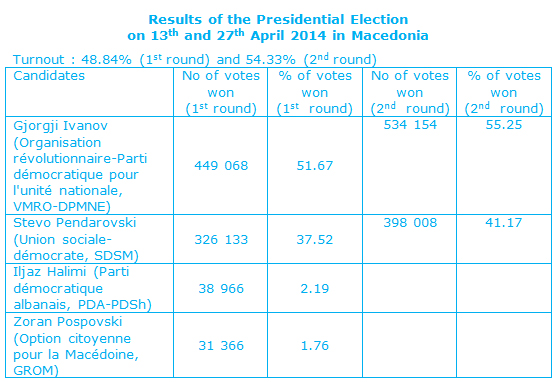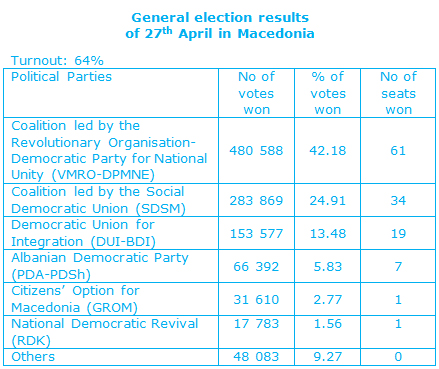Results
Elections in Europe
Corinne Deloy
-

Available versions :
EN
FR
Corinne Deloy
Outgoing head of State Gjorgji Ivanov (Revolutionary Organisation-Democratic Party for National Unity, VMRO-DPMNE) won the second round of the presidential election on 27th April. He won 55.25% of the vote ahead of Stevo Pendarovski (Social Democratic Union, SDSM), professor of Political Science at the American University of Skopje, who won 41.17% of the vote.
Gjorgji Ivanov won the first round on 13th April with 51.67% of the vote ie an absolute majority but turnout was below 50% +1 (48.86%) i.e. below the threshold set by the electoral law to validate victory in the first round.
On 27th April turnout totalled 54.33%.
 Source : Macedonian Electoral Commission http://rezultati.sec.mk/President/Results...
Source : Macedonian Electoral Commission http://rezultati.sec.mk/President/Results...
The Macedonians were also called to elect the 120 members of the Sobranie (the only Chamber of Parliament) on 27th April.
The VMRO-DPMNE, led by outgoing Prime Minister Nikola Gruevski came out ahead in the election with 42.18% of the vote and 61 seats, an absolute majority (+5 in comparison with the previous election on 5th June 2011). It came out ahead of the SDSM of Zoran Zaev which won 24.91% of the vote and 34 seats (-8).
As for the Albanian-speaking parties, the DUI-BDI, led by Alija Ahmeti and member of the outgoing government coalition won 13.48% of the vote and 19 seats (+4); the Albanian Democratic Party (PDA-PDSh) led by Menduh Thaci won 5.83% of the vote and 7 seats (-1) and finally National Democratic Revival (RDK) led by Rufi Osmani, won 1.56% of the vote and retained only one of its seats.
The Citizens' Option for Macedonia (GROM), a party founded in 2013 by the Mayor of Karposh and former Deputy Chairman of the SDSM Steve Jakimovski, won 1.56% of the vote and 1 seat.
Turnout totalled 64% i.e. +0.52 points in comparison with the elections on 5th June 2011.
The elections on 27th April, the third to be organised early (by a year), since those of 1st June 2008, followed tension that has been increasing between the VMRO-DPMNE and its government partner, the DUI-BDI, which accused Prime Minister Nikola Gruevski of refusing to nominate a consensus candidate that the Albanian speaking party would also have supported in the presidential election. Many analysts how believe that the "fight" between the two government partners was a pretext to organise early general elections in which both parties had vested interests. "It was a false dispute between the partners in office orchestrated to the give them an excuse for convening these elections so that they could assert their power more easily," declared political analyst Aleksandar Damovski.
 Source : Macedonian Electoral Commission http://rezultati.sec.mk/Parliamentary/Results...
Source : Macedonian Electoral Commission http://rezultati.sec.mk/Parliamentary/Results...
As soon as the first results were announced the social democratic opposition denounced fraud and pressure placed by the VMRO-DPMNE in office and challenged the validity of the elections - both the presidential and legislative. "Those in power purchased votes en masse in the presence of and with the assistance of the police. Macedonian citizens have been deceived. The elections were stolen," declared the SDSM leader Zoran Zaev who called for the formation of a technical government and the organisation of a new election.
The Electoral Commission indicated that voting had taken place in a correct manner. The VMRO-DPMNE said it was pleased with the election "that was perfectly calm, a proof of Macedonia's democratic maturity."
Aged 43, Nikola Gruevski comes from Skopje. A graduate of economy from the University of Saint-Clement of Ohrid of Bitola and of the University of Saint-Cyrille and Method in Skopje, he was first a trader for the Balkanska Banka AD. He made his entry into government in 1998 as Trade Minister and was then appointed Finance Minister in 1999. He was elected MP during the general election - lost by his party - on 15th September 2002. In 2003 he took over as head of VMRO-DPMNE. On 5th July 2006 the party won the election and Nikola Gruevski was appointed Prime Minister, a post he retained after the elections on 5th June 2011. After the election on 27th April he is due to continue his work as head of government. The VMRO-DPMNE has committed to improving the political and economic situation in Macedonia and to continue reforms.
On the same theme
To go further
Elections in Europe
Corinne Deloy
—
4 November 2025
Elections in Europe
Corinne Deloy
—
28 October 2025
Elections in Europe
Corinne Deloy
—
14 October 2025
Elections in Europe
Corinne Deloy
—
7 October 2025

The Letter
Schuman
European news of the week
Unique in its genre, with its 200,000 subscribers and its editions in 6 languages (French, English, German, Spanish, Polish and Ukrainian), it has brought to you, for 15 years, a summary of European news, more needed now than ever
Versions :



